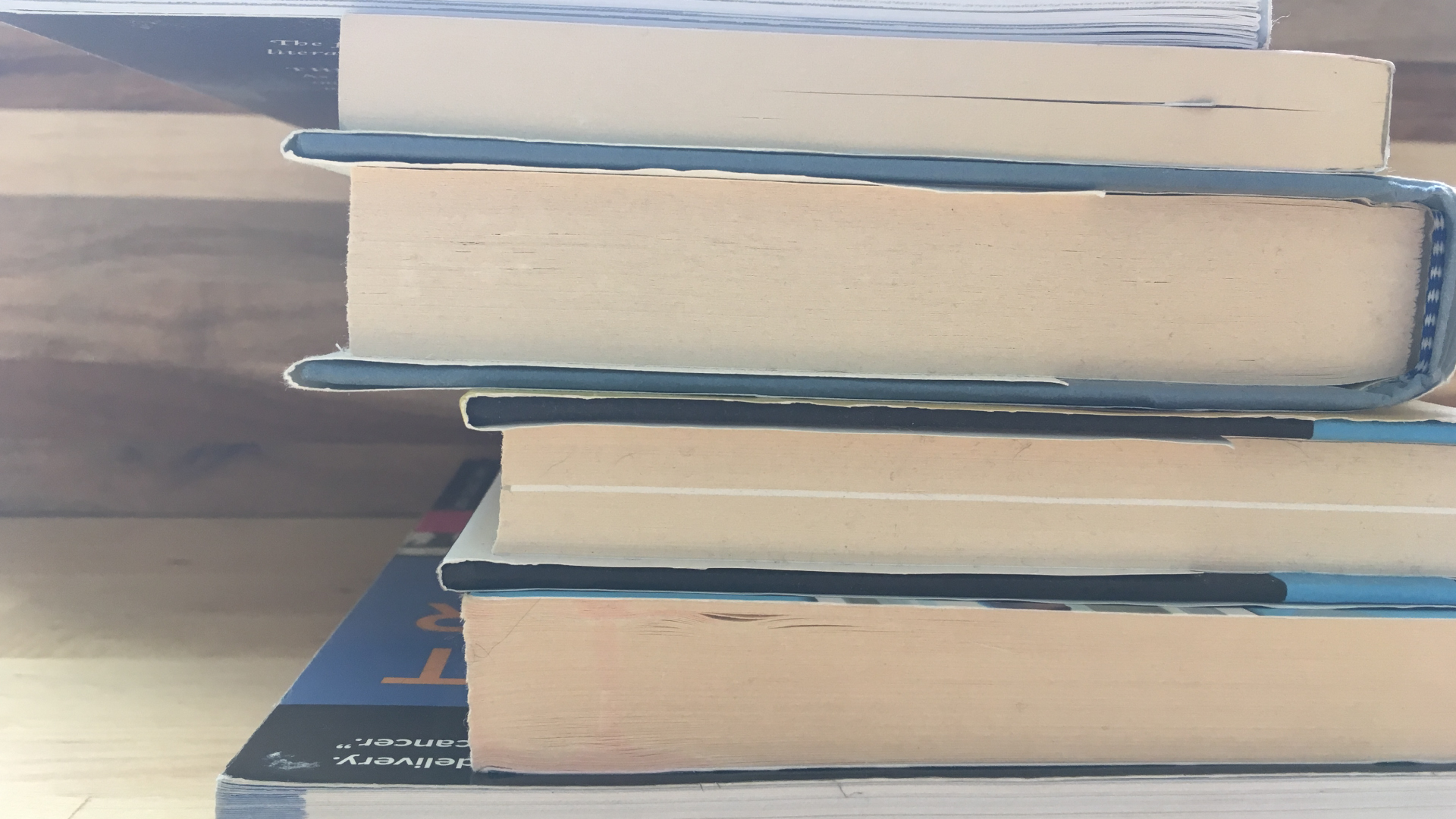Welcome to the comments and discussion of the Young Adult Cancer Book Club! We are reading Everything Happens for a Reason and Other Lies I’ve Loved by Kate Bowler. Catch up on Chapter 1, Chapter 2, Chapter 3, and Chapter 4.
Let’s get started!
Chapter 5: Surrender
Commentary by Michal N.:
Chapter 5 picks up where chapter 1 left off, when Kate is about to have surgery for colon cancer (“the second-least sexy cancer…At least it’s not rectal cancer.”). After the surgery, she is relieved to find out that she won’t need a colostomy bag. The bad news is that her stage IV diagnosis makes her, in her words, “a spaghetti bowl of cancer.” She observes that bad news in the hospital is delivered by a “green” doctor (the most anxious type) at 4 AM, when they start rounds – not ideal circumstances for discussing how long you have left to live. Yet she has a surprising reaction to all of this – feelings of love towards everybody around her. “Drugged Kate” is very vocal about her feelings and full of life advice. She enjoys having visitors and especially appreciates “the power of touch” (as opposed to people’s words) – something she has in common with the prosperity gospel believers she has studied for her doctoral dissertation. But she feels lonely between visitors, and misses her Mennonite community in Canada, particularly “how wonderful they are at suffering together.” She is especially traumatized by the idea that her young child will grow up without her.
The title of this chapter is “Surrender”, which she notes is a positive quality for many Christians but a negative one for prosperity gospel believers. To them, “surrendering” means giving up, and they believe they have the power to will things into existence through sheer faith. As a young person with a serious cancer diagnosis, she seems to acknowledge that much of what they believe in is absurd, yet something about their message of hope speaks to her. Likewise, though she understandably seems wary of the food and herbal supplement “cures” her friends try to force upon her, she admits that she is (perhaps against her better judgment) drawn to the idea of being, or feeling, in control. As a child, she admired Sisyphus, even though his persistence is not usually thought of as something to be admired. She says about the prosperity gospel believers, “They are addicted to self-rule, and so am I.” I think this is something probably all cancer patients, and anyone who has experienced any kind of trauma, struggles with. It is very easy to blame oneself for things one has no control over, even while knowing that bad things happen to good people all the time. It is also easy to be tempted by any promise of a cure, even if its effectiveness is dubious. Kate is clearly very self-aware and has a good sense of humor about the reality she’s faced with. Sometimes the humor is very dark: “I am preparing for death and everyone else is on Instagram.” Yet it is comforting to read her thoughts, which I am sure many of us can relate to.
Commentary by Betsy B.:
There’s a lot to cover in this chapter (I could go on for awhile about all the goofy things I’ve said under anesthesia too), but I’ll focus on the theme of grieving I noticed, while Kate struggles to come to terms with her diagnosis.
Throughout the chapter Kate seems to be going thru the five stages of grief. In the opening paragraph, she writes about bargaining, asking her god to be the “god of yes.” To make her better so she can live the life she’s planned with her family.
There are many depressing instances too. When she talks to her friends and family about not having enough time, that she hoped her “life and my love will not undo each other.” One of the most impactful moments comes when she is describing how she is sinking faster than everyone else and someday she will drown. “I am preparing for death and everyone else is on Instagram.” Thankfully I went thru my cancer treatment before most social media existed, but I still experienced that sad and surreal feeling of watching my friends go to college and live their lives, while I was isolated in a hospital room for two months.
As cancer survivors, we can all relate to the denial stage. “If I hide the reality, then maybe I’m not sick,” she writes near the end of the chapter. I powered thru my treatments with a very unhealthy amount of denial and avoidance, so this really hit home. Most people deny what’s happening because we do not want to let go of our control—it’s part of what makes cancer so terrifying. “Control is a drug, and we are all hooked,” she writes. Because of Kate’s ties to the prosperity gospel, she has been taught to never surrender. If something bad happens or if she fails, it is because she did something wrong. Like those people on Instagram proclaim: You have to keep believing, think positive, eat the magical kale, hashtag blessed. Kate grapples with reconciling this thought process with her cancer. How can she possibly surrender?
Eventually, Kate begins to grudgingly accept that her faith may have misled her when she realizes that there might not be a rainbow at the end of this storm, no lesson to be learned. “When will I learn that surrender is not weakness?” she writes. Surrender does not have to mean dying or giving up. Surrender is not weakness and sometimes it is necessary.
Commentary by Chelsea P.:
In this chapter, Surrender, Kate explores the topic of what it’s like to count up your time, to bargain with God for more time, and the idea of surrender. It was also in this chapter that I found it strangely hard to relate to Kate although many of our experiences have been similar. Finally, it is in chapter 5 that I really noticed that Bowler’s writing style can be rather poetic at times.
For obvious reasons, it seems to be common for mankind to reach out to God in times of need. Kate Bowler has been no exception to that rule. Upon being diagnosed, she realized that she was not done living. Her time left “…will not be sufficient to raise a little baby to adulthood. It will not be the life [she had] promised to [her] husband” (p.53). So her first reaction is to pray to God to ask him for more time, to be cancer-free.
More than anything, it seemed to me that she is more concerned about how her death will affect those around her, specifically her husband and her son. She does not appear to feel sorry for herself nor does she explore the idea of a bucket list. Bowler grapples instead with the need to surrender and explains that, in the Christian meaning of the word, Surrender is akin to “letting go and sinking into the arms of God, whereas Presbyterians would see her as a “passive vehicle of God’s grace” and to the believers in the prosperity gospel, “surrender sounds like defeat” (p. 82-83). Is surrender giving up, or is it placing one’s trust in God?
I mentioned earlier that I was able to draw many parallels between my own experiences. Similarily, I have a young son (who was 4 months old when I was diagnosed), a cold, clinical oncologist similar to the one she described and a huge support system of friends, family and community members who mean the best but have difficulties understanding. That being said, I am an atheist at heart and therefore find it very difficult to fully relate to her fully.
Finally, I just wanted to point out some of the more poetic quotes from this chapter that I enjoyed reading (and re-reading!). Some of these spoke to me for varying reasons; others I simply found interesting as metaphors for our cancer diagnoses.
“Live unburdened. Live free. Live without forevers that don’t always come. These are my best hopes for you, that you press forward at last. I don’t know how to die, but I know how to press this crushing grief into hope, hope for them” (p. 60).
“I am on a boat caught in the storm and I say to the crew in a bright voice, Don’t worry about me. I was already going to die” (p. 66).
“Life is a series of losses…with age we slowly lose our sense and even our pleasures, our parents and then our friends, preparing us for our own absence” (p.68-69).
“The water is rising and the leaves may break and it will sweep us all away. But until then, I am here. I will not let go” (p. 71).
Join in next Monday for the comments and discussion on Chapter 6: Christmas Cheer!
—
Thanks for joining us for Chapter 5: Surrender of Everything Happens for a Reason and Other Lies I’ve Loved by Kate Bowler! Join in next Monday for the next chapter!
We will talk about a few chapters each Monday until the book is done. If Monday happens to be a holiday, then the post will publish on Tuesday. Once we finish the book, we’ll use one more Monday to talk about general feelings from the book and anything else you’d like to discuss. We’ll also have a video chat book club discussion at the end! Join in, in the comments every week! Also, there will probably be spoilers so read along with us!
Excited about the young adult cancer book club? Have any suggestions for future reads? Let us know!











